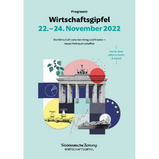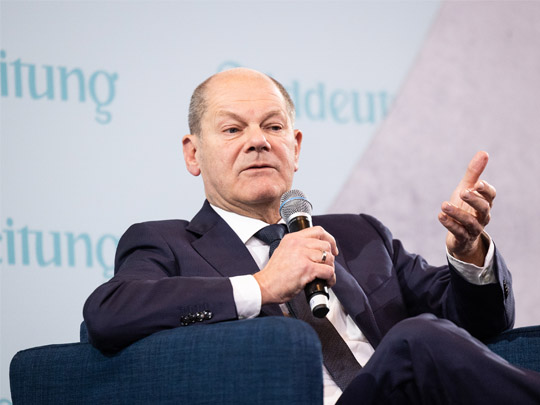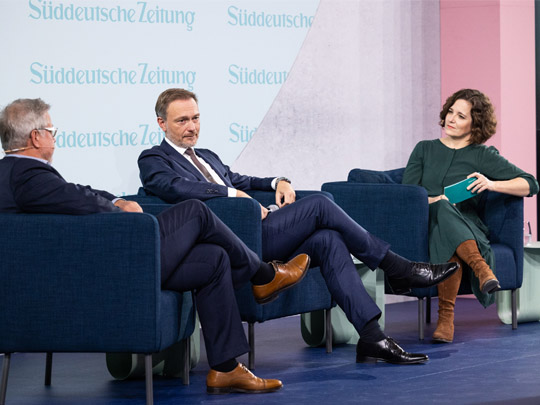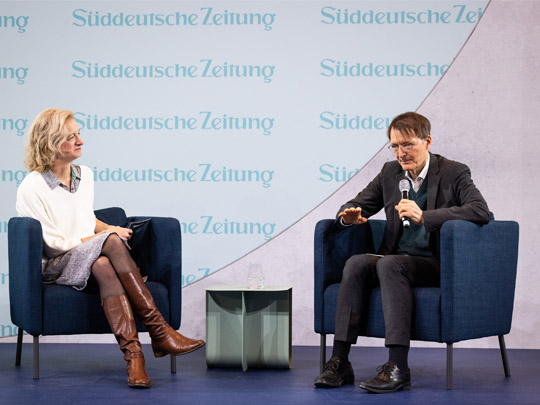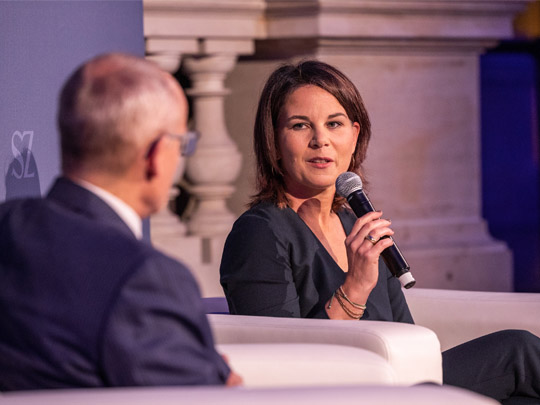SZ Wirtschaftsgipfel 2022
Here you can find impressions of the summit and the complete coverage of the Süddeutsche Zeitung.
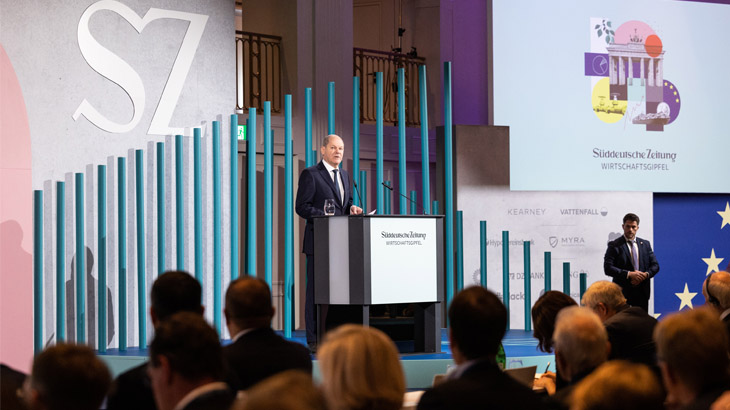
Find out more about the reports, features and interviews surrounding the conference on sz.de and take a look at the highlights of the congress in our picture gallery. Have fun with the review!
Impressions
Exciting insights into the 2022 summit
Speakers
More than 60 high-profile speakers from politics, business, science and culture
Our guests
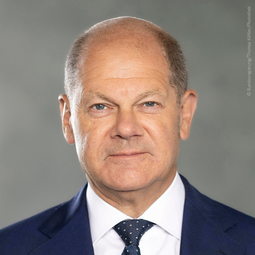
Olaf Scholz
German Chancellor, SPD
Olaf Scholz, born in 1958, was elected as only the 9th Chancellor of the Federal Republic of Germany on December 8, 2021. This needs to be remembered occasionally when general criticism of the Social Democrat once again gets out of hand: Whether he communicates enough and moderates coalition sufficiently energetically or not: the man can win elections. And he must govern in the face of a turning point in Europe unprecedented since World War II.
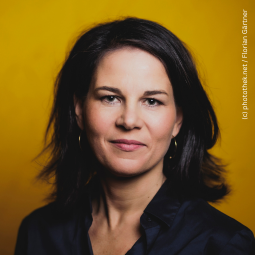
Annalena Baerbock
Federal Minister for Foreign Affairs of the Federal Republic of Germany
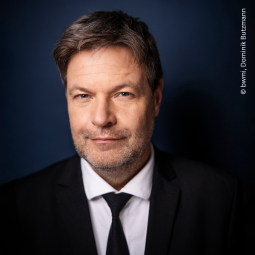
Robert Habeck
German Vice Chancellor and German Federal Minister for Economic Affairs and Climate Protection
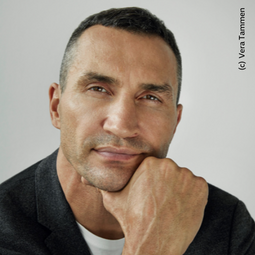
Wladimir Klitschko
Multiple world heavyweight boxing champion, long-time No. 1 according to all independent rankings, celebrity on all channels: that's how Wladimir Klitschko (born 1976) is known, along with his older brother Vitali, who later entered Ukrainian politics and is now mayor of Kiev. Wladimir Klitschko became an entrepreneur. Even before the Russian invasion, he joined the reserve army of the Ukrainian Armed Forces. Today he is an influential face of Ukraine's defense struggle against Putin
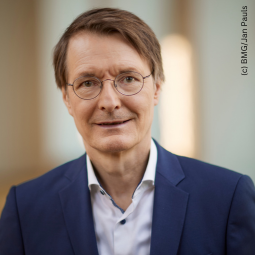
Karl Lauterbach
German Federal Minister for Health
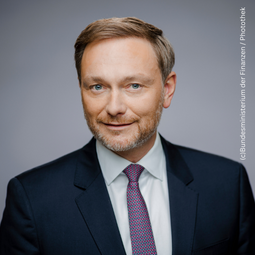
Christian Lindner
Federal Chairman of the FDP
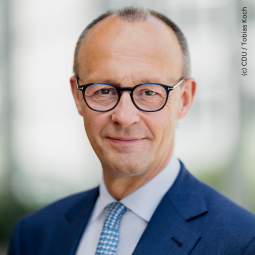
Friedrich Merz
Federal Chairman of CDU Germany
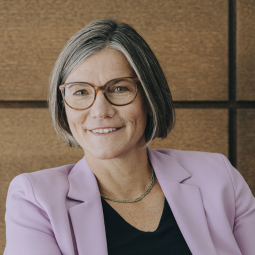
Christiane Benner
IG Metall
She is the first woman to head the world's largest independent trade union: In 2015, Christine Benner (born in 1968) was elected vice chairwoman of the powerful IG Metall union, for which she had worked in various capacities since 1997; a headline at the time read: "IG Metall dares revolution". Benner knows the industry that has shaped Germany for 125 years: she is on the supervisory boards of BMW and Continental, for example. As a sociologist, she analyzes how Germany is changing in the age of digitalization, the energy transition and war - and she wants to shape these changes in the interests of employees.
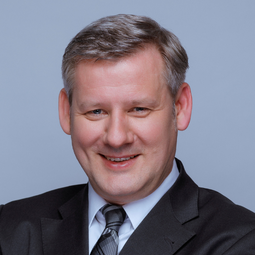
Oliver Blüher
Slack Technologies
Oliver Blüher, born 1974 , is Head of Central Europe at Slack and thus also responsible for business in the DACH region. The IT professional studied in Paderborn and Nottingham. Prior to his current role at the U.S. office communications platform, Blüher was responsible for business in Germany at Dropbox and held leading positions at German software manufacturer SAP, most recently as a member of the executive board.
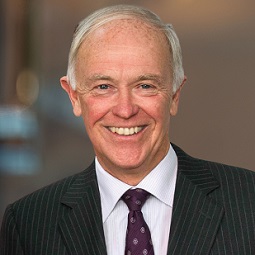
Sir Tim Clark
Emirates Airline
Sir Tim Clark, born in 1949, was part of the founding team of Emirates and has been instrumental in its expansion into the largest international airline. Clark has been President of Emirates Airline since 2003. The hub in Dubai, which is unparalleled anywhere in the world, is his creation. Emirates offers long-haul connections there to all parts of the world. After the deep cut of the Corona pandemic, Clark and his team are busy restoring the Dubai hub to its former greatness as quickly as possible.
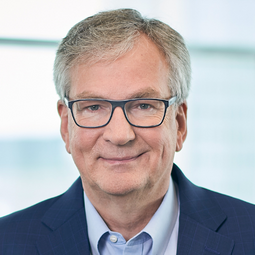
Martin Daum
Daimler Truck
born in 1959, has been Chairman of the Board of Management of Daimler Truck AG since 2019 and in this role also oversaw the spin-off and IPO of the truck division in December 2021. He joined the former Daimler-Benz AG back in 1987, two years after graduating with a degree in business administration. Born in Karlsruhe, he spent many years of his career in the USA, including as the person responsible for the commercial vehicle manufacturer's North American business.
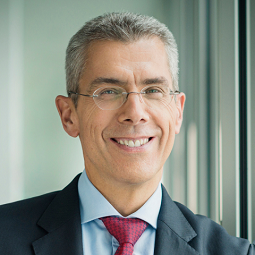
Michael Diederich
HypoVereinsbank – UniCredit Bank
Michael Diederich, born in 1965, has been CEO of Hypo-Vereinsbank, a subsidiary of the Italian UniCredit Group, since January 2018. Prior to that, he was responsible for the credit institution's investment banking division. His conviction is that investment banking must primarily serve corporate customers.
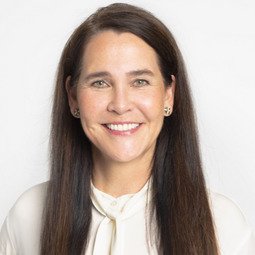
Anja-Isabel Dotzenrath
BP
Anja-Isabel Dotzenrath has been a member of the BP Group's Global Executive Board since March 2022. Prior to that, she was head of RWE Renewables, one of the world's leading renewable energy companies. Dotzenrath studied electrical engineering and business administration in Aachen and then initially worked in management consultancies, after which she worked for the energy group E.ON before moving to RWE.
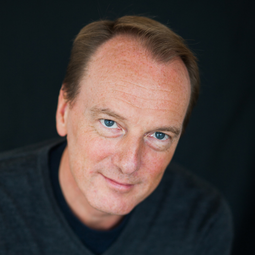
Marc Elsberg
Bestselling author
The Austrian advertiser (born in 1967) has long been at the top of the bestseller lists as a thriller author. Unfortunately, his 2012 novel "Blackout - Morgen ist es zu spät" (Blackout - It's Too Late Tomorrow), about an almost perfectly planned terrorist attack on the international power grid, is once again very topical and the subject of the SZ Economic Summit. Elsberg describes with great expertise the depressing consequences for all areas of society.
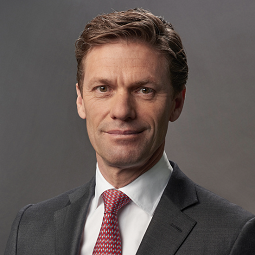
Martin Eisenhut
Kearney
Martin Eisenhut has been working in the consulting industry for around 25 years. He has been working for the international consulting firm Kearney since 2015 and has been responsible for the business in Germany, Austria and Switzerland since 2016. Eisenhut studied at the Technical University of Munich and still lives in the Bavarian capital. Prior to his studies, he earned a journeyman's certificate as a machinist.
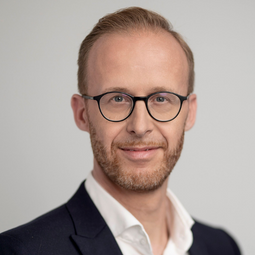
Christian Feuerherd
Vattenfall Wärme
Christian Feuerherd has been CEO of Vattenfall Wärme since September. The subsidiary of the Swedish energy group Vattenfall operates the largest district heating network in Western Europe in the capital, with around 1.3 million households connected. He is a trained banker and studied banking management and has worked for Vattenfall for 15 years.
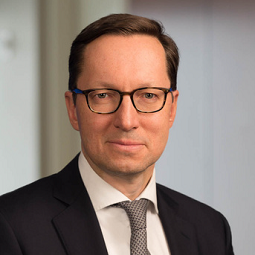
Wolfgang Fink
Goldman Sachs Bank Europe
Wolfgang Fink, born in 1966, has been head of Europe at U.S. investment bank Goldman Sachs since 2019. Born in Austria, he studied economics and law in Vienna. He joined Goldman Sachs as early as 1993 - and rose steadily: He was responsible for Eastern Europe, then for European industrial companies, then for Germany and Austria, finally for all of Europe.
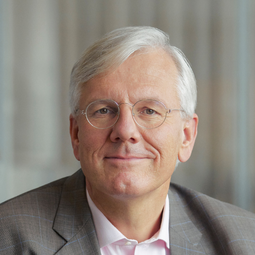
Christoph Franz
Roche
born in 1960, has been Chairman of the Board of Directors of the pharmaceutical group Roche, based in Basel, since 2014. Previously, he was CEO of Deutsche Lufthansa. His heart beats for Germany as a business location, he says. And he worries that the country is currently gambling away its role of being an innovation leader.
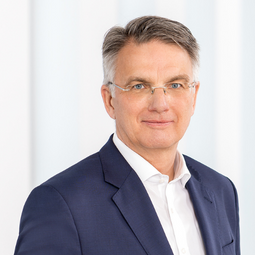
Uwe Fröhlich
Co-CEO, DZ BANK
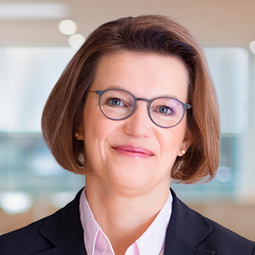
Britta Fünfstück
Hartmann Group
born in 1972, knows the healthcare market from many perspectives. For many years, she worked for the medical technology division of Siemens. Since the beginning of 2019, she has been CEO of the Hartmann Group. She has put her portfolio into a few simple words: Help, Care, Protect.
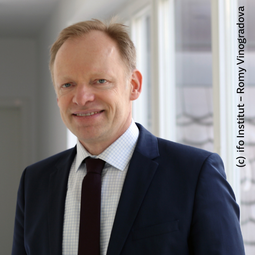
Clemens Fuest
ifo Institut
For many years, the finance scientist from Westphalia, who is pronounced with a long "u" rather than an "ü", born in 1968, has been an established figure in German economic policy. Formerly as a German professor in Oxford, which is rare enough, and now as president of the Munich ifo Institute. Moderate in tone, but persistent in his approach, the member of numerous advisory committees represents a consistent market economy course.
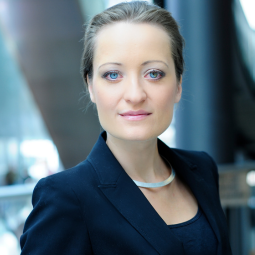
Sabine Griebsch
Managing Director, GovThings
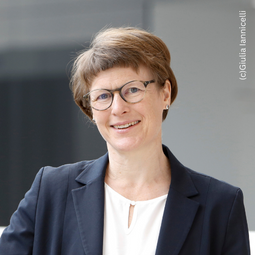
Veronika Grimm
Friedrich Alexander University
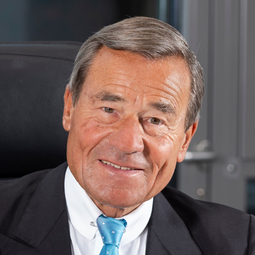
Wolfgang Grupp
TRIGEMA
born in 1942, studied business administration in Cologne and took over responsibility for his father's company Trigema in Burladingen, Swabia, as early as 1969. The company was founded in 1919 as Mechanische Trikotwarenfabrik Gebrüder Mayer. Grupp has the textiles produced only in Germany and is known for television commercials in which he himself appears with a monkey. His daughter Bonita (born 1989) and his son Wolfgang (born 1991) also work in the family business.
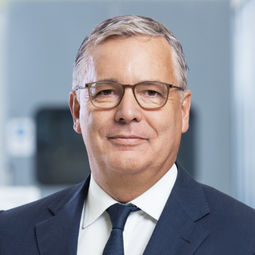
Toralf Haag
Voith
Toralf Haag (56) has been Chairman of the Board of Management of Voith GmbH since 2018. Prior to that, he was Chief Financial Officer of the company for two years. Haag, who holds a degree in business administration, began his career in 1994 as a personal assistant to the CEO of Thyssen Handelsunion AG in Düsseldorf and later spent several years in management positions at companies in the USA and Switzerland.
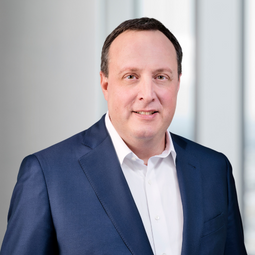
Markus Haas
o2 Telefónica
born in 1972, began his career after studying law in 1998 as a legal and regulatory officer at Telefónica in Germany - then Viag Interkom. Since 2017, Haas has been Chairman of the Management Board of Telefónica Deutschland Holding AG in his hometown of Munich. For internal digitization, the amateur chef relies on ideas from the team.
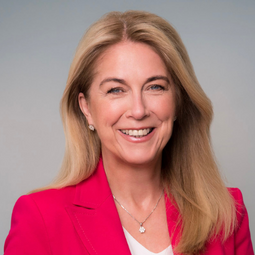
Ingrid Hengster
Barclays
Ingrid Hengster, born in 1961, is one of the best-known female bankers in Germany. She has been the head of Germany at the British investment bank Barclays since the beginning of 2022. Before that, she was a member of the board of the state development bank KfW for almost eight years. Born in Austria, she studied law in Salzburg, followed by professional positions at Commerzbank, UBS, Credit Suisse, ABN Amro and Royal Bank of Scotland.
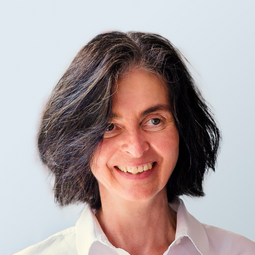
Kerstin Hochmüller
Marantec Group
Kerstin Hochmüller, born in 1967, is the head of Marantec, a family-owned company in East Westphalia that has been developing drive and control systems since 1957. From 2013, she completed the generation change in the Marantec Group and has been transforming the company ever since. She studied business administration in Bielefeld and Berlin.
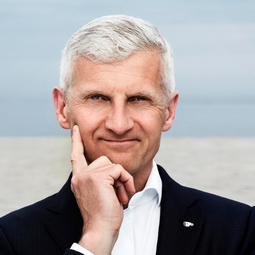
Andrea Illy
Illycaffè
Andrea Illy, born in 1964, was basically born into that Trieste coffee dynasty founded in the early 1930s. The president of Illycafé has already experienced many changes in the past decades, most recently the Corona pandemic: everyone in the home office, the Italian bars closed. And the cafe manufacturer has long since been thinking beyond espresso: coffee should not only taste good, it must also be grown sustainably. It is the climate crisis that drives him above all today.
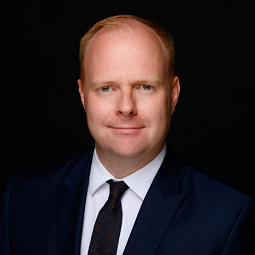
Paul Kaffsack
Myra Security
born in 1981, is co-founder of the German technology manufacturer Myra Security. Since 2012, the company has been using its services to protect digital applications against attacks from the web. Kaffsack's services are trusted by the German government, DAX-listed and financial companies. Kaffsack also shares his knowledge as a speaker at conferences and as a mentor for young entrepreneurs.
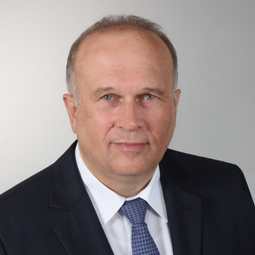
Thomas Dosch
Tönnies
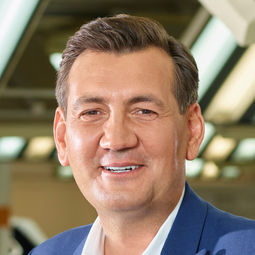
Gunnar Kilian
Volkswagen
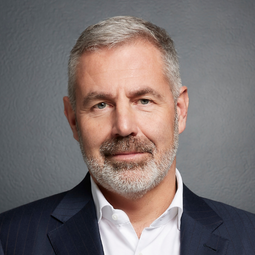
Stefan Klebert
CEO, GEA Group
born in 1965, has a degree in mechanical engineering and is flying high both privately and professionally: most recently, he was Chairman of the Board of Schuler AG and played a key role in the company's business in China. He has been Chairman of the Executive Board of GEA Group since 2019. In 2010, he founded FlyingHope. The association flies seriously ill children to hospices, hospitals or even on holiday. Stefan Klebert is a pilot himself.
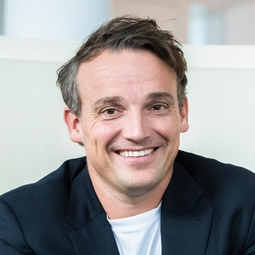
Christian Klein
SAP
Christian Klein, born in Heidelberg in 1980, started working as a student trainee at the global software company SAP in 1999. He quickly made a career for himself and was promoted to the Group Executive Board in 2018. When American Bill McDermott surprisingly left in 2019, Klein took over the leadership of Europe's largest software provider together with U.S. manager Jennifer Morgan. He has been sole CEO since April 2020.
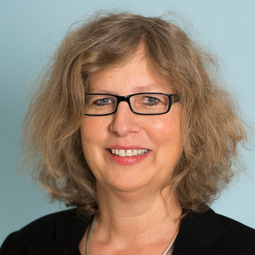
Alexandra Knauer
KNAUER Wissenschaftliche Geräte
Alexandra Knauer, born in 1966, is the second-generation head of Knauer, a medium-sized company that manufactures measuring equipment for research. As the head of a technology company, the business graduate is committed to getting more girls interested in technical and scientific professions - or, like her, to becoming entrepreneurs themselves. KNAUER was given the German Innovation Prize this year.
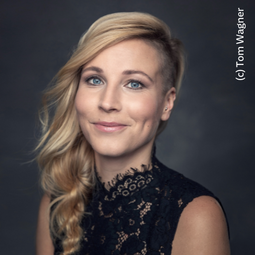
Fränzi Kühne
Edding
Fränzi Kühne, born in 1983, was once Germany's youngest female supervisory board member. After leaving the social media agency TLGG, which she founded with two friends when she was 25, she wrote a book - about men and the questions you never ask them - and is now Chief Digital Officer at pen manufacturer Edding.
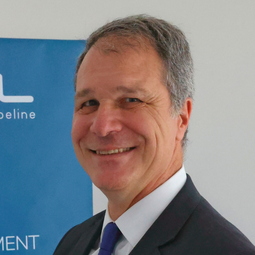
Alessio Lilli
Società Italiana per l'Oleodotto Transalpino
Alessio Lilli, 58, likes to compare his oil business to a parcel service like DHL. Someone orders oil, someone sells oil, someone brings oil. "We get a package and deliver it on," says Lilli, head of Italy's TAL Group. For more than 50 years, the northern Italian company has operated the Transalpine Oil Pipeline, a 753-kilometer pipeline network that connects the port of Trieste with refineries in Ingolstadt or Karlsruhe.
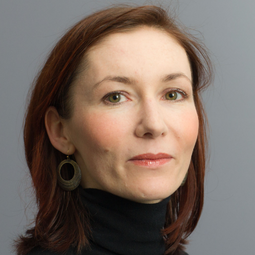
Claudia Major
Stiftung Wissenschaft und Politik
The first rule for journalists is not to allude to names. Yet this would be so obvious in the case of Claudia Major, who has matured into one of the most important voices in the public discourse during the Ukraine war at the latest and is a welcome guest on every expert panel. She is extraordinarily experienced, factual and knows - which is not a matter of course for experts - how to formulate things concisely and yet correctly. As head of the Security Policy Research Group at the Stiftung Wissenschaft und Politik (German Institute for International and Security Affairs) and a member of numerous committees, she is at the center of policy advice in Berlin.
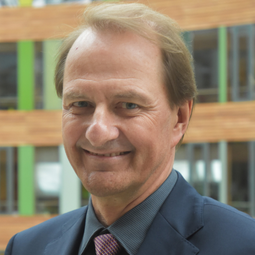
Dirk Messner
Bundesumweltamt
born in 1962, studied political science and economics and initially made a career in academia. In 2003, Messner was appointed Professor of International Political Economy at the University of Munich. In 2018 he moved to the United Nations in Bonn, and in 2020 he was appointed President of the Federal Environment Agency, based in Dessau. With 1600 employees, it is the largest environmental authority in Europe.
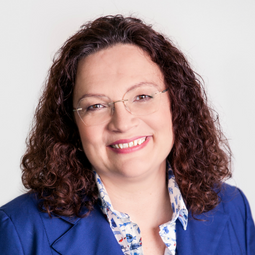
Andrea Nahles
Bundesagentur für Arbeit
As labor minister, the left-wing SPD politician and former Juso chairwoman (born in 1970) won the respect of (some) employers' representatives for her expertise and practical approach. As SPD leader, she failed after a year in full view of the public due to the structures of her party and the intrigues of (some) leadership colleagues. As chairwoman of the Federal Employment Agency in 2022, she celebrated a much-acclaimed comeback.
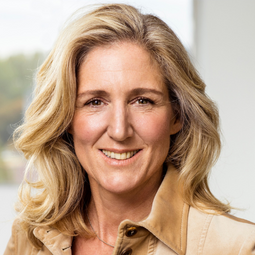
Sabine Nallinger
Stiftung KlimaWirtschaft
born in 1963, is a board member of the KlimaWirtschaft Foundation, which sees itself as a driver on the path to a climate-neutral economy. Previously, she worked for Stadtwerke München and Münchner Verkehrsgesellschaft mbH, among others, where she was head of research and development. From 2008 to 2020, she sat on the Munich City Council for the Green Party, and in 2014 she ran (unsuccessfully) for the office of Mayor of Munich.
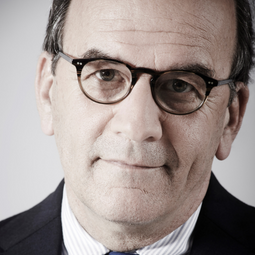
Raffaelo Napoleone
Pitti Immagine
Raffaello Napoleone, 68, has a clear mission as head of the Florentine fashion fair organizer Pitti Immagine: to take Italian fashion out into the world. For the passionate professional sailor, this is an obvious choice: He grew up in downtown Rome among the big names in the industry. After difficult years at Corona, he is now concerned with the future of globalization - and thus also with the future of Italian fashion.
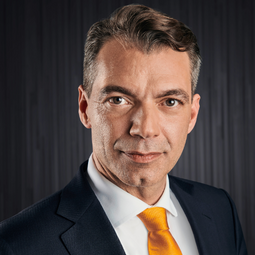
Vinzenz Pflanz
Chief Business Officer & Member of the Management Board, SIXT
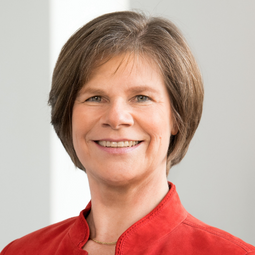
Ulrike Protzer
Technische Universität München
born in 1962, is one of the scientists whose brilliance only became visible to the general public with the Corona pandemic. She answers every question about the virus calmly, patiently and kindly on the basis of the current state of knowledge. In expert circles, the physician has long been a luminary. She is Director of the Institute of Virology at Helmholtz Zentrum München and heads the Institute of Virology at Technische Universität München. She has been dealing with the dangers and therapy of viral diseases for decades.
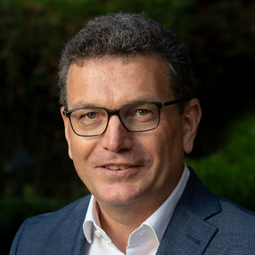
Helmut Reisinger
Palo Alto Networks
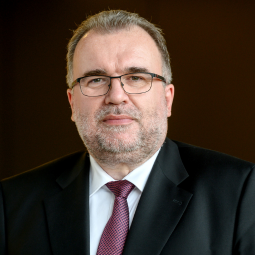
Siegfried Russwurm
Präsident, Bundesverband der Deutschen Industrie
There are probably few men who have as deep an insight into the German economy as Siegried Russwurm, born in 1963. Since the beginning of 2021, Russwurm, who holds a doctorate in engineering, has been President of the Federation of German Industries (BDI). For decades, he worked for Siemens. Until his retirement in March 2017, he sat on the Managing Board for a good eight years. He heads the Supervisory Board and Shareholders' Committee of Voith and is Chairman of the Supervisory Board of thyssenkrupp.
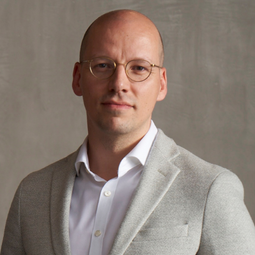
Gundbert Scherf
Helsing
The cyberwar expert advised the Ministry of Defense for more than two years. 2021 he founded Helsing, the Munich-based startup develops an artificial intelligence that can make military decisions for the battlefield. The goal: deter and serve democracy. Scherf is an economist and consultant; he worked for McKinsey for a long time.
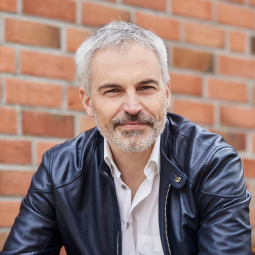
Gerhard Schick
Bürgerbewegung Finanzwende
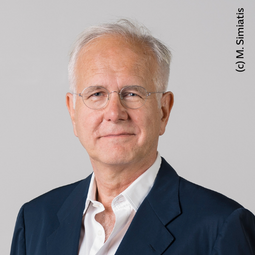
Harald Schmidt
Entertainer, host and actor
Harald Schmidt, born in 1957 in Neu-Ulm, is the - so far - unbeaten grandmaster of ambiguity. Sometimes he's on the Traumschiff, then he hosts a venerable classical music program on WDR, himself an organist with a C certificate. His shield? Multiple irony.
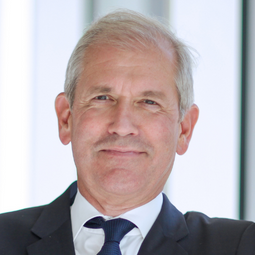
Jens Scholz
University Hospital Schleswig-Holstein
Jens Scholz, born in 1959, has been Chairman of the Board of the University Hospital Schleswig-Holstein since 2009. He is also deputy chairman of Section 17 of the Leopoldina and chairman and board member of the Association of University Hospitals in Germany. His research focuses on anesthesiology, emergency medicine and intensive care medicine. Scholz has received several awards for his work. Most recently in 2022 with an honorary doctorate from the Serbian University of Health Sciences.
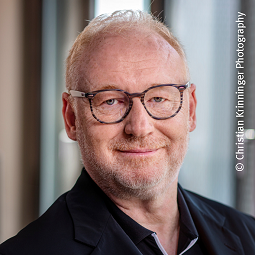
Joachim Schreiner
Salesforce Germany
Born in 1962, he joined CRM market leader and cloud provider Salesforce in 2007 after working at Boole and Babbage, Veritas Software and Symantec. There he is now responsible for strategic management and development as well as key account business in Germany and Austria. Schreiner also supports various projects in the areas of education and integration, and is specifically committed to improving education in STEM subjects.
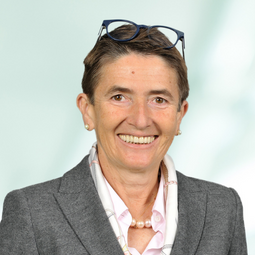
Zvezdana Seeger
RWE
Born in 1964, the Chief Human Resources Officer and Labor Director knows her way around complicated situations. At Toll Collect, she got the toll system up and running, followed by board positions at Postbank and Deutsche Bank, among others. Since November 2020, she has been at RWE AG, where she is also responsible for IT in the HR department.
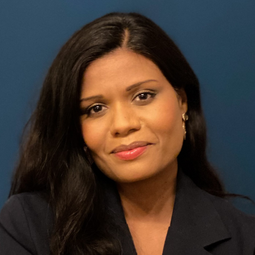
Irene Selvanathan
NEUROSPACE
born in 1980, founder and CEO of the Berlin start-up Neurospace, would like to have small cars driving on the moon by the middle of the decade. The engineering graduate is developing a lunar rover with her team that will measure about ten by 50 centimetres. She wants to make research on the moon affordable with such vehicles. For this purpose, the entrepreneur has further developed the so-called Cubesat standard for shoebox-sized satellites in order to be able to offer a modular design that is as inexpensive as possible.
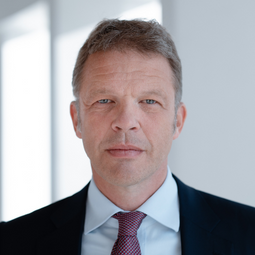
Christian Sewing
Deutsche Bank
Christian Sewing, born in 1970 in East Westphalia, actually wanted to become a sports journalist. After graduating from high school, however, he did an apprenticeship as a banker at the Bielefeld branch of Deutsche Bank, then studied part-time at the Bank Academy in Bielefeld and in Hamburg. In 2015, he rose to the Management Board, and in 2018 he was appointed Chairman of the Management Board of Deutsche Bank. With the exception of two years at the real estate bank DG Hyp, Sewing has always worked for Germany's largest financial institution.
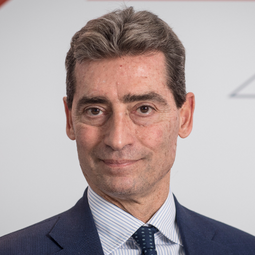
Andrea Sironi
Assicurazioni Generali
Economics professor Andrea Sironi, born in 1964, has headed the board of directors at Italy's largest insurer Assicurazioni Generali since February 2022. He is a professor of finance at the private Bocconi University in Milan, where he was rector from 2012 to 2016, and conducts research primarily on risk management in financial institutions. In his career, he has been a financial analyst at Chase Manhattan Bank in London and a member of the boards of directors at the London Stock Exchange, Banco Popolare, Cassa Depositi e Prestiti, Unicredit Group and Bank Intesa Sanpaolo. He was also Chairman of the Board of Borsa Italiana and Vice-Chairman of the Board of Banca Aletti.
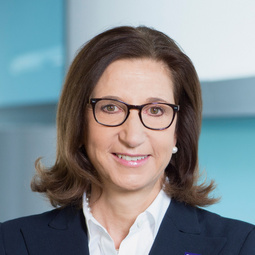
Margret Suckale
multi-supervisor
Margret Suckale, born in Hamburg in 1956, studied law and initially worked for the U.S. Mobil Oil group. She then moved to Deutsche Bahn, where she made a career for herself and ended up as a member of the Board of Management. She then went to the chemical group BASF, where she was a member of the Board of Executive Directors until 2017. Since then, she has sat on supervisory boards, for example at the Dax companies Infineon and Deutsche Telekom.
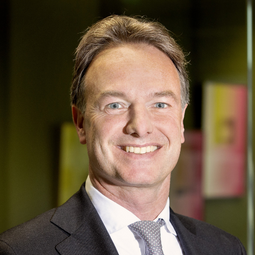
Steven van Rijswijk
ING Group
born in 1970, has been CEO and Chairman of the Executive Board of the major Dutch bank ING Group since July 2020, where he has worked since 1995. He has been a member of the Executive Board since 2017. Before his promotion to CEO, the graduate economist headed the risk management and various other divisions of the bank.
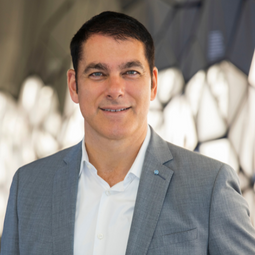
Stefan Vilsmeier
Brainlab
A German entrepreneur and founder, that's what Wikipedia says about Stefan Vilsmeier. That's true, and yet this sober description doesn't begin to capture the personality of the lad from the Bavarian provinces (born in Poing in 1967), who reached for the stars as a student with an IT textbook and is now the founder, owner and head of Brainlab, a company that has revolutionized surgical technology in hospitals and is one of the world market leaders in the field of image- and computer-assisted surgery.
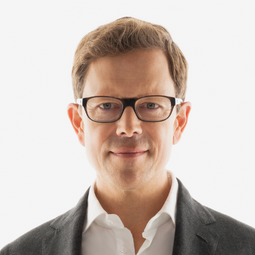
Moritz von der Linden
Marvel Fusion
is co-founder and CEO of Marvel Fusion, the German technology pioneer in the field of safe, clean and reliable energy generation. He has more than 20 years of experience in successfully founding and leading global high-tech companies. His first company, the foreign exchange transaction platform 360 Treasury Systems AG, was acquired by Deutsche Börse AG for $879 million in 2015.
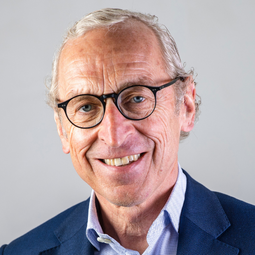
Georg Graf Waldersee
German Committee for UNICEF
The management consultant Georg Graf Waldersee (63), for many years a member of the international management committees of Arthur Andersen and EY and today a member of the supervisory boards of various companies, has served on the honorary board of Unicef Germany since 2016. In this capacity, he was on an extended trip through Ukraine at the beginning of November 2022 and will report on his experiences at the Business Summit.
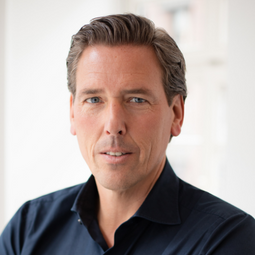
Tobias Warweg
GGW Group
Until March 2020, Tobias Warweg was Chief Sales Officer at the Liability Association of german Industry. Since then, he has been heavily involved in the consolidation of the broker market and, with the support of private equity investor HG Capital, is buying up industrial and commercial brokers under the umbrella of the GGW Group. His vision: "We are building the leading owner-managed insurance broker for german SMEs, no more and no less".
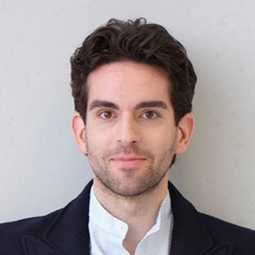
Daniel Wiegand
Lilium
Daniel Wiegand, 37, studied aerospace engineering at the Technical University of Munich. In 2015, he founded Lilium and has since been developing the Lilium Jet, an electric air cab, with his team. Wiegand stepped down as CEO of Lilium at the end of October, but remains responsible for future programs as chief engineer.

Susanne Wiegand
Renk
Before Susanne Wiegand, who has a degree in business administration, took over as head of the Augsburg gearbox manufacturer Renk on May 1, 2021, she had 20 years of professional experience in management positions. And not just anywhere: ships, defense, tanks - that was her world for years. Wiegand headed Rheinmetall's Electronic Solutions division in Bremen, was with the German Naval Yards shipyard group in Kiel and ThyssenKrupp Marine Systems AG.
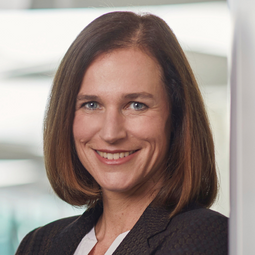
Judith Wiese
Siemens
Judith Wiese, born in 1971, doesn't believe that women like the women's quota. But it was "obviously necessary," the Siemens executive told the SZ last year. "We saw that not much would change otherwise." Wiese knows business life; she spent many years working in various roles for food company Mars. Then, in October 2020, she had arrived at the zenith of German industry: She became labor director at Siemens.
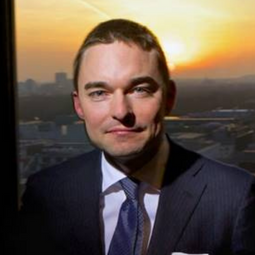
Lars Windhorst
Tennor Holding B.V.
born in 1976, is regarded as the stand-up guy of the German economy. Having just come of age, Chancellor Helmut Kohl praised him as a prodigy of the German economy. Later, Windhorst suffered a spectacular financial crash before rejoining the league of international investors. His global network of companies includes a Flensburg shipyard and the lingerie brand La Perla. Windhorst recently attracted a great deal of attention with his plan, as an investor, to turn Bundesliga club Hertha BSC Berlin into a European big-city club.
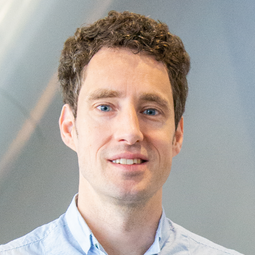
Ralf Winkler
QualiFiction
who holds a doctorate in mathematics, uses his start-up QualiFiction to predict which text could become a bestseller. To this end, the Hamburg-based team has fed an artificial intelligence with countless books, and the algorithms developed with it are intended to support publishers in their work.
Moderation
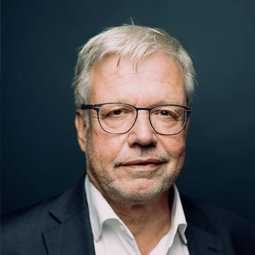
Marc Beise
Foreign Correspondent Rome, Founder SZ Wirtschaftsgipfel; Süddeutsche Zeitung
Dr. Marc Beise is an experienced journalist and business editor at Süddeutsche Zeitung. For more than two decades, he has been shaping economic reporting with well-founded analyses and astute commentary. He founded the Economic Summit and is currently responsible for the Süddeutsche Zeitung's Italy correspondence.
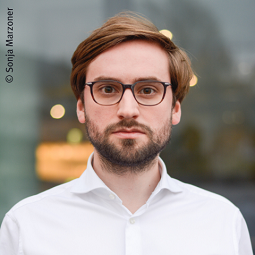
Bastian Brinkmann
Süddeutsche Zeitung
Bastian Brinkmann is deputy head of the business section of the Süddeutsche Zeitung. Born in 1988 in North Rhine-Westphalia, grew up near Berlin, with stations in Dublin and Brussels. Cologne School of Journalism. Studied economics and political science in Cologne and South Korea.
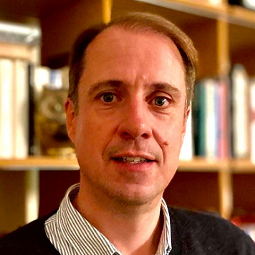
Caspar Busse
Deputy Head of the Business Editorial, Süddeutsche Zeitung
Caspar Busse has worked and written for the Süddeutsche Zeitung since mid-2005, mainly on economic and media topics; he is deputy head of the economics editorial department. He studied economics at the LMU in Munich and attended the Georg von Holtzbrinck School for Business Journalists in Düsseldorf. Before joining SZ, he worked for Handelsblatt for more than ten years.
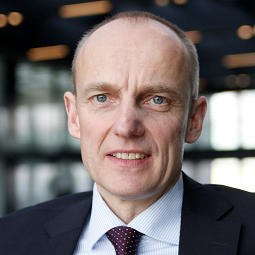
Wolfgang Krach
Süddeutsche Zeitung
Wolfgang Krach, born in 1963, joined the "Süddeutsche Zeitung" from the news magazine "Der Spiegel" in 2003, as managing editor and head of the newsdesk. In 2007, Krach was appointed to the editorial board, initially as deputy editor-in-chief. He has been editor-in-chief of "Süddeutsche Zeitung" since April 1, 2015, together with Judith Wittwer since July 2020.
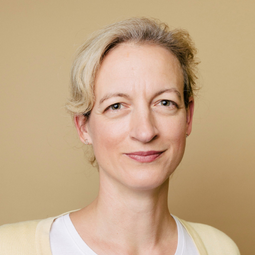
Lisa Nienhaus
Süddeutsche Zeitung
Born in Oberhausen in 1979, studied economics and politics in Cologne and Stockholm, at the same time attending the Cologne School of Journalism. 10 years as economics editor at the "Frankfurter Allgemeine Sonntagszeitung", then moved to the current position as deputy head of the economics department and head of the Frankfurt bureau. Since autumn 2022 she has been head of the SZ economics department.
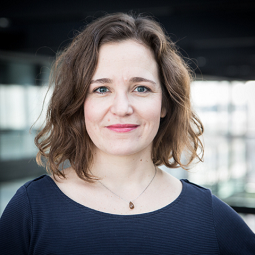
Henrike Roßbach
Süddeutsche Zeitung
has been SZ correspondent in Berlin since 2018 and deputy head of the parliamentary office since mid-2022. She reports on the FDP and the federal government's financial and tax policies. Previously, she was an economics correspondent in the Berlin office of the FAZ for eight years and before that was economics editor of the FAZ in Frankfurt. She studied economics and is a graduate of the Cologne School of Journalism.
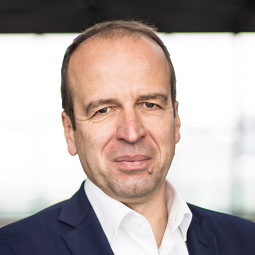
Ulrich Schäfer
Süddeutsche Zeitung
Ulrich Schäfer is deputy editor-in-chief of the Süddeutsche Zeitung. After seven years at Der Spiegel, he began reporting from Berlin in 2003, initially as deputy head of the SZ parliamentary bureau. From 2007, he headed the business editorial department for nine years, the Munich, Region and Bavaria department for three years and built up the SZ's new newsdesk as head of news.
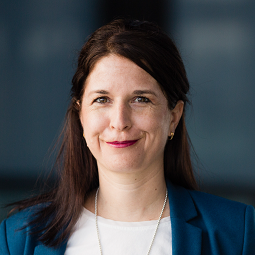
Judith Wittwer
Süddeutsche Zeitung
born in 1977, has been leading the editorial team of the Süddeutsche Zeitung together with Wolfgang Krach since summer 2020. Previously, she was business editor for Axel Springer's Handelszeitung in Zurich before returning to Tages-Anzeiger as head of news and CvD and joining the editorial team in 2016, then as editor-in-chief from 2018.
